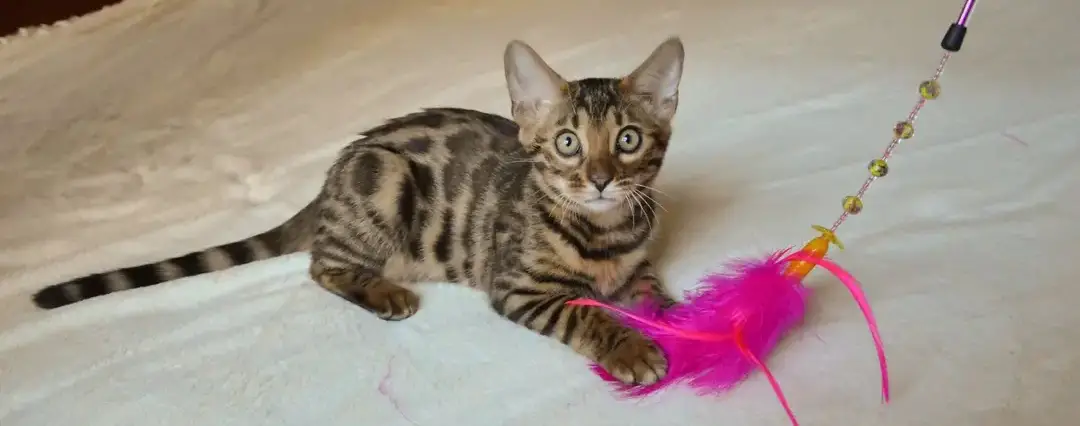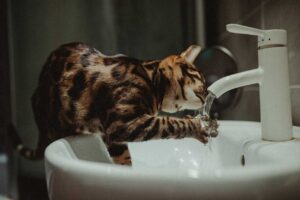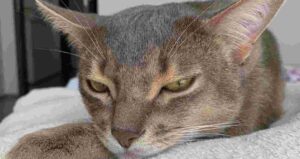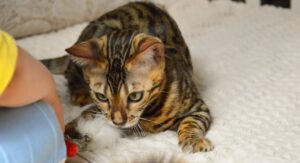In my opinion, there are lots of benefits to keeping your Bengal cat healthy, which I will be discussing in this post.
There are also ways or things you should be doing to ensure you are keeping your Bengal cat healthy, which I will also discuss in this post.
Keep reading to find out more about some simple ways of keeping your Bengal cat healthy!
Benefits of Keeping Your Bengal Cat Healthy
Keeping your Bengal cat healthy offers numerous benefits for both you and your feline friend.
Firstly, a healthy Bengal cat is less likely to develop common health issues such as obesity, diabetes, and heart disease, ensuring a longer and happier life for your cat.
Secondly, a healthy cat will have a stronger immune system, reducing the risk of infections and illnesses.
Additionally, maintaining your Bengal cat’s health through regular exercise and a balanced diet can help prevent behavioral problems and promote a well-adjusted and contented pet.
Lastly, a healthy Bengal cat will provide you with endless joy, love, and companionship, making your bond even stronger.
How Do You Keep Bengal Cats Healthy
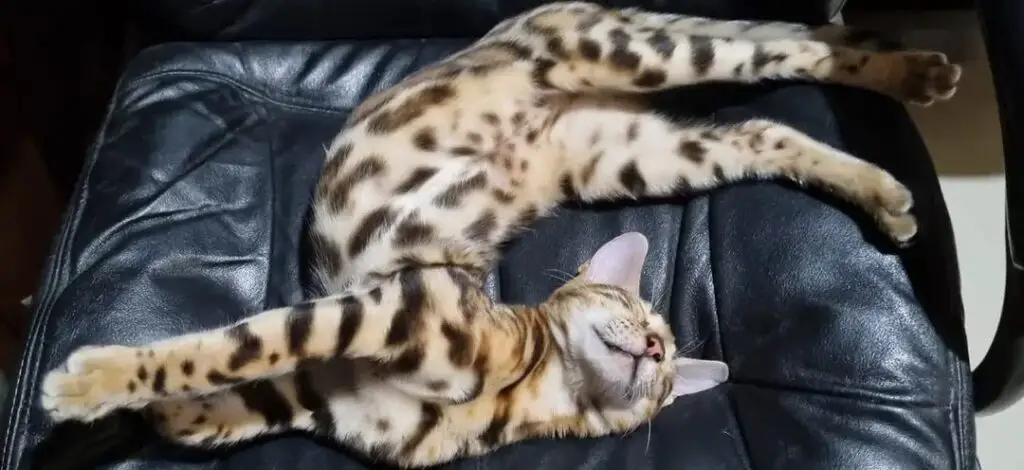
As a long-time cat owner, I can definitely tell you that there are lots of ways to keep your Bengal cat healthy.
However, I have lots of Bengal cat owner friends who I contacted before writing this post, so I gathered lots of information about Bengal cats from them.
Based on what I gathered from my friends who own Bengal cats, and my experience living with cats, here are some effective ways of keeping your Bengal cat healthy:
1. Give your Bengal cat needed vaccinations
From what I gathered about Bengal cats from different owners, vaccinations are a crucial aspect of preventive healthcare for your Bengal cat.
These vaccinations help protect your Bengal cat from various infectious diseases that can be life-threatening.
Bengal cat kittens typically need a series of vaccinations starting at around 6–8 weeks of age, with booster shots given every 3–4 weeks until they reach 16 weeks old.
The core vaccines recommended for Bengal cats include:
- Feline distemper (panleukopenia)
- Feline herpesvirus
- Feline calicivirus
- Rabies
After the initial kitten series, your Bengal cat will need booster shots every 1–3 years, depending on the vaccine and your veterinarian’s recommendations.
It’s essential to keep your Bengal cat up-to-date on their vaccinations to ensure they are well-protected against these diseases.
2. Neutering/spaying your Bengal cat
Neutering (for males) and spaying (for females) are essential procedures that offer numerous health and behavioral benefits for your Bengal cat.
These surgeries involve removing the reproductive organs, preventing unwanted breeding, and reducing the risk of certain health issues, such as:
- Uterine infections (pyometra) and ovarian/testicular cancers
- Prostate problems in males
- Roaming and aggressive behavior
- Spraying and marking territory
The ideal age for neutering/spaying is typically between 4–6 months, but your veterinarian can provide specific guidance based on your Bengal cat’s individual needs.
By having your Bengal cat spayed or neutered, you can help them live a longer, healthier, and more content life.
3. Regularly deworming your Bengal cat
My friends who own Bengal cats told me that internal parasites, or worms, can cause various health issues in Bengal cats, such as weight loss, diarrhea, vomiting, and even anemia in severe cases.
They also said that regular deworming is essential to eliminate these parasites and prevent reinfection.
To do this, your veterinarian can recommend the best deworming medication and schedule based on your Bengal cat’s age, health status, and risk factors.
Bengal cat kittens typically need deworming every 2–4 weeks until they reach 12 weeks old, followed by regular deworming every 3–6 months for adult cats.
4. Feed your Bengal cat a high-quality and balanced diet
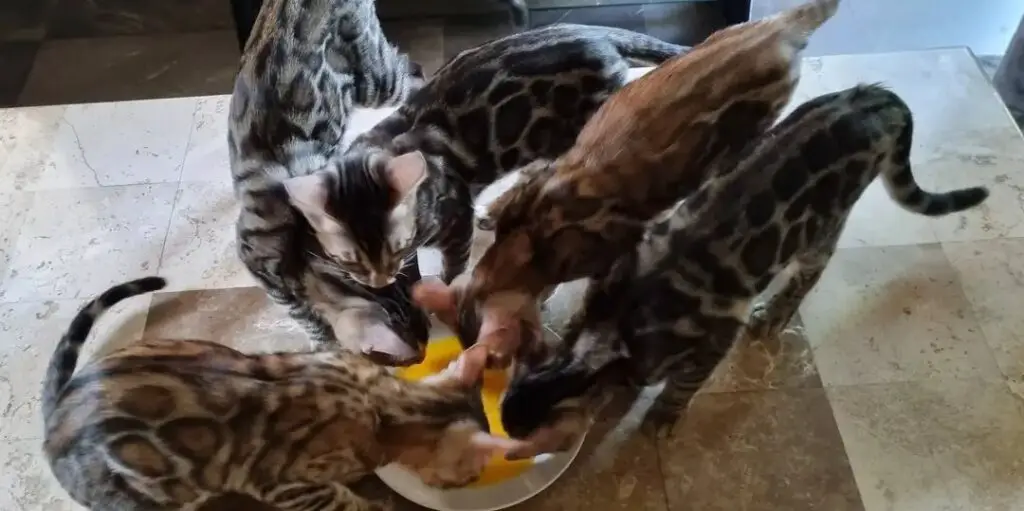
A balanced diet is crucial for your Bengal cat’s overall health and well-being, according to my friends who own Bengal cats.
Bengal cats are known for their high energy levels and active nature, so they require a diet that meets their specific nutritional needs.
I suggest you look for high-quality cat food that is formulated for your Bengal cat’s life stage (kitten, adult, or senior) and activity level.
The food should contain:
- High-quality protein sources
- Balanced levels of essential fatty acids
- Appropriate amounts of carbohydrates
- Essential vitamins and minerals
I strongly recommend you should consult with your veterinarian or a feline nutritionist to determine the best diet for your Bengal cat.
They can provide guidance on portion sizes, feeding schedules, and any dietary modifications needed based on your Bengal cat’s individual health status or preferences.
Food Bengal cats should and shouldn’t eat.
5. Encourage regular physical exercise
Bengals are known for their high energy levels and love for play, so engaging them in regular physical exercise is crucial for keeping them fit and mentally stimulated.
I recommend you provide your Bengal cat with interactive toys, such as feather wands or puzzle feeders, to encourage active play.
You should also set up a cat tree or scratching post to promote climbing and jumping, which are natural behaviors for Bengals.
Regular play sessions with your Bengal cat will not only keep them physically active but also strengthen the bond between you and your furry friend.
6. Ensure your Bengal cat has access to clean litter boxes
My friends also said that maintaining proper litter box hygiene is vital for your Bengal cat’s health.
Bengals are generally very clean animals and prefer to have a clean and odorless litter box.
Make sure to scoop the litter box daily and replace the litter regularly.
Additionally, provide multiple litter boxes in different areas of your home, especially if you have a large living space.
This will ensure that your Bengal cat always has access to a clean and convenient place to relieve themselves.
7. Groom your Bengal cat regularly
Bengals have a short, dense coat that requires regular grooming to keep it healthy and free from matting.
Brush your Bengal cat’s fur at least once a week to remove loose hair and prevent hairballs.
You should use a soft brush or a grooming glove to gently remove any tangles or knots.
Regular grooming sessions also provide an opportunity to check for any skin issues or abnormalities.
Additionally, you should remember to trim your Bengal cat’s nails regularly to prevent overgrowth and potential injury.
8. Engage in play and cuddle with your Bengal cat regularly
Bengals are highly social cats and enjoy human companionship, so I advise you to make time to engage in interactive play sessions with your Bengal cat to stimulate their mind and satisfy their natural hunting instincts.
You should use toys that allow them to chase, pounce, and stalk. Additionally, Bengals love cuddling and being close to their owners.
You should also spend quality time with your Bengal cat, petting them, and providing affectionate attention.
This will not only make them feel loved but also contribute to their overall well-being.
9. Regularly inspect your Bengal cat for fleas and ticks
According to my friends who own Bengal cats, fleas and ticks can cause discomfort and transmit diseases to your Bengal cat.
Therefore, they advise you should regularly inspect their fur, especially around the ears, neck, and tail, for any signs of fleas or ticks.
If you spot any, consult your veterinarian for appropriate flea and tick prevention methods.
They also suggested that using a flea comb during grooming sessions can also help detect and remove any pesky parasites.
10. Ensure access to fresh water at all times
All my friends who own Bengal cats told me that hydration is crucial for your Bengal cat’s health and that you should always provide your Bengal cat with a clean and fresh water source at all times.
You should Consider using a water fountain or multiple water bowls throughout your home to encourage regular drinking.
This is especially important if you feed your Bengal cat dry food, as it can be dehydrating.
Monitor their water intake to ensure they are drinking enough to stay properly hydrated.
11. Monitor your Bengal cat’s weight regularly
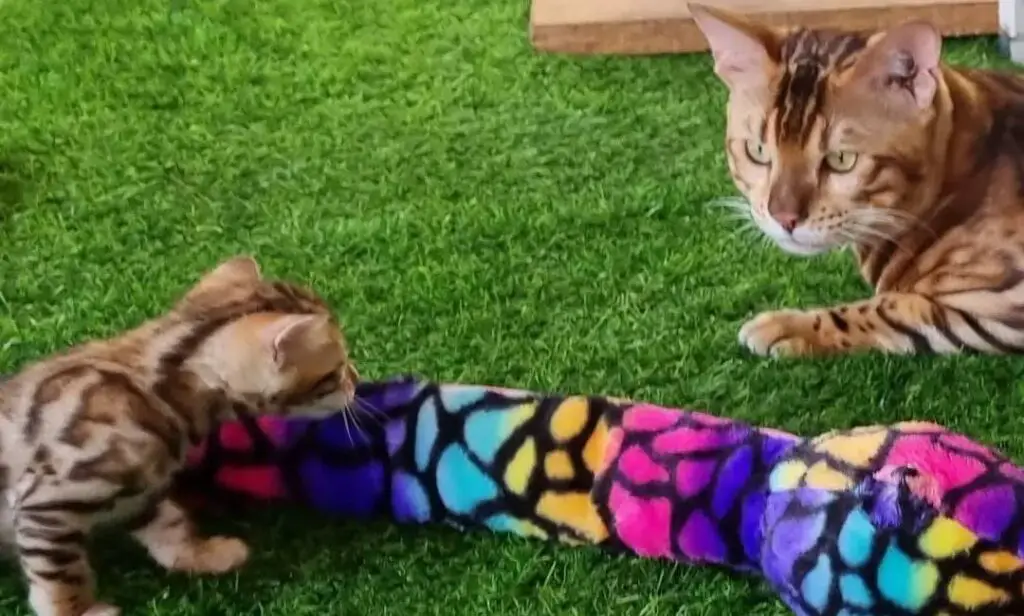
According to my friends who own Bengal cats, weight management plays a significant role in your Bengal cat’s overall health.
Obesity can lead to various health issues in Bengal cats, including joint problems and diabetes.
Monitor your Bengal cat’s weight regularly by observing their body shape and feeling their ribs.
I advise you should always consult with your veterinarian about the appropriate amount and type of food to feed your Bengal cat to maintain a healthy weight.
I also advise you to avoid overfeeding and provide a balanced diet that meets your Bengal cat’s nutritional needs.
12. Regular veterinary visits
Regular check-ups with your veterinarian are essential for your overall Bengal cat’s well-being.
You should schedule annual wellness exams to ensure that your cat is in good health and to address any potential health concerns.
Keep in mind that vaccinations and parasite prevention treatments should also be discussed and administered as recommended by your veterinarian.
Regular veterinary visits allow for early detection and treatment of any underlying health issues, helping to keep your Bengal cat healthy and happy.
Final Thoughts
In summary, a healthy Bengal cat requires a balanced diet, regular exercise, and proper veterinary care.
By providing them with nutritious meals, engaging in interactive play sessions, and scheduling routine check-ups, you can ensure their well-being and longevity.
So, prioritize their health and make every day a purrfectly happy and healthy one for your beloved Bengal!
Related Questions
How often should I feed my Bengal cat?
It is recommended to feed your Bengal cat small portions of high-quality cat food two to three times a day, following the guidelines provided by the manufacturer. This helps prevent overeating and maintains a healthy weight.
Are there any specific health issues I should watch out for in Bengal cats?
While Bengal cats are generally healthy, they may be prone to certain health conditions like hypertrophic cardiomyopathy (HCM) and progressive retinal atrophy (PRA). Regular veterinary check-ups can help detect and manage these potential health concerns.
How can I ensure my Bengal cat stays mentally stimulated?
To keep your Bengal cat mentally stimulated, provide them with interactive toys, puzzle feeders, and scratching posts. You can also engage in play sessions that mimic hunting activities, such as chasing toys or hiding treats for them to find.
What vaccinations does my Bengal cat need?
Like any other cat, Bengals require core vaccinations, including those for feline herpesvirus, calicivirus, and panleukopenia. Consult with your veterinarian to determine the appropriate vaccination schedule and any additional vaccinations based on your cat’s lifestyle and risk factors.

